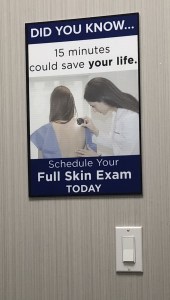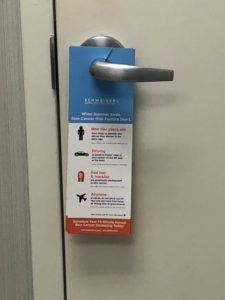Profit at the Expense of Patients
A couple weeks ago, I booked an appointment with a dermatologist to get a skin condition looked at. It’s nothing serious, but it nevertheless needs to be treated. The appointment was confirmed with an M.D. at a location I had visited previously. Prior to being seen, I waited in an office containing 4 advertisements for dermatological services. I couldn’t help but take pictures, some of which are included in this post. Soon after I finished taking pictures, the door opened and in walked a woman I hadn’t met before. She introduced herself as a physician assistant (P.A.) and told me she’d be taking 
The P.A. said that because it was the first time visiting with her, I should get a full body exam. She wanted to “get familiar with my freckles and moles.” I politely informed her that I had been to the office previously and that there’s no need for the examination. My skin condition affects my eyes. I performed some online research before the appointment and found that I can be treated with antibiotics. I shared this with the P.A. and she decided to take a look. She suggested I get “eye fillers.” For those who don’t know what eye fillers are, they’re injections of hyaluronic acid that make you look less tired. They in no way treat my skin condition. The benefits are purely cosmetic. Moreover, the procedure comes with risks, not to mention a cost of over $1,000.
I visited a dermatologist with a discrete problem and was recommended completely unrelated and unnecessary procedures. Why did this happen? My experience is the result of the financialization of dermatology.
Private Equity Financialization
Schweiger Dermatology Group, owner of the dermatology office I visited, recently received a $100 million investment from a private equity firm. As with most financial investments, the investor expects a return on the capital they put at risk. This return, of course, is expected to be generated from patients. Unfortunately, patients are pushed into unnecessary visits, exams, and procedures. A field that formerly treated patients in need has morphed into a highly capitalized cash cow.
 P.A.’s are cheaper to pay than M.D.’s, but can generate plenty of revenue nonetheless. The pipeline is also deeper, as it is quicker and cheaper to become licensed as a P.A. than it is to become an M.D. Dermatology treats skin conditions, many of which require continued applications of topical remedies. To treat acne, as an example, a dermatologist may prescribe cleansers, ointments, and pills like Accutane. Treatment can take years, which guarantees recurring business for the dermatology office and its investors. Schweiger Dermatology Group further monetized its patients by releasing its own line of branded treatments. While financialization of a medical sector is particularly egregious, it’s not the only instance of private equity firms profiting at the expense of the vulnerable.
P.A.’s are cheaper to pay than M.D.’s, but can generate plenty of revenue nonetheless. The pipeline is also deeper, as it is quicker and cheaper to become licensed as a P.A. than it is to become an M.D. Dermatology treats skin conditions, many of which require continued applications of topical remedies. To treat acne, as an example, a dermatologist may prescribe cleansers, ointments, and pills like Accutane. Treatment can take years, which guarantees recurring business for the dermatology office and its investors. Schweiger Dermatology Group further monetized its patients by releasing its own line of branded treatments. While financialization of a medical sector is particularly egregious, it’s not the only instance of private equity firms profiting at the expense of the vulnerable.
How Financialization Can Fracture Society
Private equity firms have gotten involved in the management of nursing homes, mobile home parks, and payday loan providers. Frankly, private equity firms that have exploited these opportunities have made a killing for their general partners and investors. There is no shortage of billionaires among those in the private equity industry, but is this accumulation of wealth such a good thing? Finance, after all, is zero-sum, so who loses when the private equity titans win? Let’s explore three areas private equity firms have exploited:
-
Nursing Homes
Over the years, private equity firms have purchased nursing home chains like HCR ManorCare. HCR ManorCare, the second largest nursing home chain in the world, was acquired by Carlyle Group in 2007. In March of last year, HCR ManorCare filed for bankruptcy. Under Carlyle’s management, HCR ManorCare committed an increased number of health-code violations, laid off hundreds of employees, and mistreated its patients. State inspectors found elderly patients with bedsores and infections.
HCR ManorCare ultimately could not pay off the debts it incurred following Carlyle’s leveraged buyout. In an effort to service its debt, elderly patients suffered greatly. Unfortunately, the elderly don’t always have the means or the physical strength to find alternative nursing homes that offer better treatment. This fact was, of course, exploited. HCR ManorCare offers a case in point why nursing homes should be designated as protected against alternative investment managers like Carlyle.
-
Mobile Home Parks
John Oliver recently examined the private equity industry’s entrance into the mobile home space. He shared that while mobile homes are more affordable relative to standard homes, private equity firms are making them less so. The term “mobile home” is effectively a misnomer. It’s very pricey to move them, so they often stay stationary within parks full of other mobile homes.
These parks are now owned by private equity firms, which rent the land to the mobile home owners. Coincidentally, (or maybe not), Carlyle is invested in mobile home parks along with TPG and Blackstone. Private equity firms have been raising the rent within the mobile home parks to unsustainable levels. This practice has pushed mobile home owners into deeper states of financial distress and have left some homeless. Private equity firm profits are made at the expense of the poor. They are ruining the lives of their tenants.
-
Payday Loan Providers
Some of us may be familiar with the toxic practices employed by payday lenders. Payday lenders charge incredibly high interest rates on cash advances extended to low income individuals. A chunk of the principal payment typically comes out of the borrower’s paycheck. Due to the high levels of interest, borrowers can get stuck in a debt cycle that only ends with bankruptcy. While this reality is devastating for borrowers, it’s big business for private equity firms. Over 5,000 payday lender locations are owned by private equity firms. Cash flow in the form of high interest payments creates large profits for private equity firms and their investors.
The Widening Wealth Gap
The continued exploitation of vulnerable populations doesn’t just harm the vulnerable. These practices drain government coffers as welfare payments are made to sustain those without money for basic necessities. With high rent and interest payments, the poor cannot escape poverty. This increasing divide between rich and poor is only growing worse as financialization pervades more markets. We need more protection and regulation for vulnerable populations, which may ultimately help these populations shrink in size. Such protections are necessary if we’re to repair the fractures our society has suffered.
Do you want to further discuss the financialization? Leave a comment below or contact me directly.

